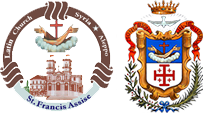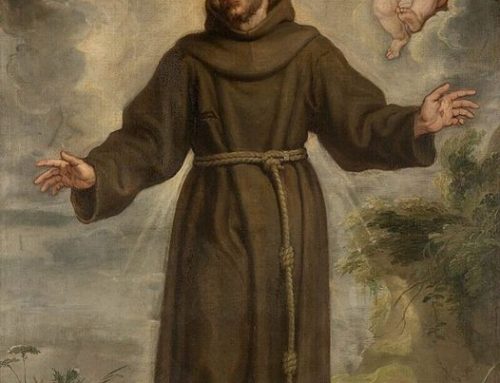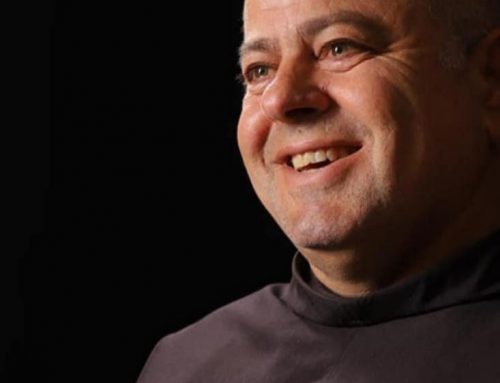The parish priest of St. Francis of Assisi in West Aleppo recounts his mission in Syria, still battered by the war
24.12.2018, at 12:46 p.m. – int. Ibrahim Alsabagh
The parish priest of Saint Francis Church located in the west side of Aleppo, Father Ibrahim Alsabagh, recently received the international prize “Beato Padre Pino Puglisi” in Palermo. We asked him to speak about his mission.
Father Ibrahim, how did the Syrian war come about?
The Syrian war was born in the heart of man, who is capable of doing extreme good as well as extreme evil. The Syrian crisis arises from self-absorption and greediness which both rest in the heart of each human being. Wars come about whenever self-absorption and greediness assume a collective dimension. In this case, nations begin lusting after other nations’ energy wealth and geopolitical power; they think they can solve their problems to the detriment of other countries.
What are the facts on the ground?
It has been already eight years since the war erupted. Last year, ten international Armies fought on the ground with no coordination among each other. Some armies are particularly strong about fighting against some others: the situation is thus extremely complex and delicate.
Is peace at hand?
It is difficult to make peace. War is more appealing to many than peace for a simple reason: chaos, or disorder, allows people to do what they cannot do under peace: for example, people can sell weapons. The weapon business achieved a record $ 700 billion this year, although everyone thinks that the amount is even higher.
In the past two years has the situation in Aleppo been less dramatic than previously?
I am not sure whether it is more or less dramatic. It is true that, from December 22, 2016, different neighborhoods have been spared from bombings. However, bombings still occur in the west side of the city and in three neighborhoods, in particular. A few days ago, armed groups launched chlorine missiles in the outskirts of Idlib. Although, they did not kill anyone, they caused serious collateral damages to some 11o people who had to wear oxygen masks for hours, if not days, at the hospital. Thus, no matter how dramatic it is, the situation remains absurd.
What future do you envision for Syria?
Syria was a land of coexistence among different people. It was a mosaic of different colors in which there was room for everyone. On the contrary, in these days it has been envisioned the creation of religious and ethnic partitions. This is against our history and will never solve the problem of coexistence. It seems that the international community has not learnt the lesson from the World Wars. In the Middle east, it is going on a piece of the “piecemeal World War III” of which the Pope spoke. Thus, we see black clouds piling up on the horizon. What has been occurring throughout the Syrian war is a possible introduction to a cold winter filled with thunders which could possibly expand in a global World War.
How is life in Aleppo today?
Once Aleppo was as economically powerful as the city of Milan in Italy: 60% of the economic production of the country was based in Aleppo. Now Aleppo has broken wings, so to speak. It is no longer able to be productive. In particular, there are no available jobs. Thus, there is no economic development. The industrial machinery has been stolen, and the means of production have been destroyed. Therefore, the unimaginably desperate poverty that is spreading can usher in a city famine, or even a large-scale famine affecting the whole country.
Who remains in the city, then?
Many continue to leave the country with no hope for coming back because there is no future. The minorities, and the Christians in particular, are those who suffer the most. One need only consider that two thirds of the Syrian population as well as of the Christian community has gone. It is very hard to imagine that those who went abroad will be able to make their way back to Syria. Those who were displaced in other Syrian cities or Lebanese refugee camps may make their way back home. From the beginning of the year up until now, ten families that belong to my parish came back to Aleppo, while ten others left the city. To put it bluntly, only the poor remain in the city because they cannot escape.
Standing before such evil, we cannot help but ask “where is God in all this? Why is He silent?”
This situation shows what the Mysterium iniquitatis is. Before the stumbling block of evil, someone may blame God for being absent; this is a temptation. On the contrary, we see God each day: we see a suffering God, nailed to the cross, in the limbs of a suffering humanity deprived of its dignity. First and foremost, we adore God as being present in the wounds of our people. Then, we see Him being at the helm of the Church in the midst of waves which are higher than those of the Galilean sea. Each day, we see Him taking care of us with all His tenderness and providing for the needs of His creatures.
How have you survived to all this?
Many times, we ask ourselves your question: how have we survived? We have survived so many missile attacks; we have survived the shortage of water, electricity, and of many other things. This has been possible because the Lord has been present with all His power: the power of good, of care, and of providence. This power has been always amazing to us. It is amazing to us today. Each day, we see this power in the small as well as in the great things. We see it in the people who pray for us all around the world. We see it in many people who make economic sacrifices to help us out. Similarly to what happened to the bread and fishes of the Gospel parable, the small change we have been receiving has multiplied to the degree that we have been able to see a surplus. In our daily life in Aleppo, we are witnessing to the tender Presence of the Lord who is with us in the midst of the bombings.
What expectations led you to Aleppo?
When I left for Aleppo I had no means, but an open heart armed with faith and charity. I can compare this bold and creative charity to that of a mother who, having given birth for the first time, has no experience on how to breastfeed, clean, and take care of her child, but still holds a spiritual instinct that leads her to do everything anyhow. Charity is something that spring from an open heart, which leads one to make things he or she has never conceived of. This is how all the miracles I have witnessed in my four years in Aleppo have come about.
What does that mean, practically?
It means that the Lord has asked me not only to carry out a spiritual task, but also to cope with an emergency which goes beyond limits. Every day I have to be a nurse, a doctor, an engineer, a policeman, an architect, a social assistant. Therefore, how can I be a parish priest? Simply by doing God’s will at once, making myself available to his call, every moment. In Aleppo, it is God who plans and works, while the parish priest is just a useless servant.
What does it mean, for you, to do God’s will in such a situation?
It is not giving in, it’s the experience of waiting, like what we’re doing in Advent. We are in pitch dark but are waiting with confidence the dawn to arrive. The dawn of peace is still to come, we live in fear that it will come, suffering, patiently waiting for it to dawn of a new day that should come, nay, that it will. We don’t know when, but we should be ready and watchful.
And being a parish priest?
All the work done to support the population in need, I mean all the work carried out in emergency, all rebuilding, I feel as part as my pastoral vocation. If we see the parish as a “field hospital”, as Pope Francis said, we certainly cannot talk of God to a sick child or to a family in need, before healing the child and rebuilding the destroyed dwelling, and before paying for a quite expensive heart surgical operation. The first expression of the pastoral ministry is meeting the immediate, practical need at once. Then, there’s our habit that opens up the way.
What do you mean? Are you referring to the religious habit you’re wearing?
I am, yes. Because it is a reminder for everybody that everything has a meaning starting from the event of Jesus Christ. It is Jesus Who sends me to them, and I, a friar and a father, am the means to convey His Love and Transfiguration here and now, in their lives. Therefore everything I do, as a humanitarian service, is just bearing witness to the Love of Christ to His creatures. Indeed, what has “stolen my heart” and made me “leave my net behind”, is Jesus Christ. I didn’t leave my house and my family for any humanitarian ideology, but because I was asked by One who commands history, and this prompts me to give my life the way He did.
But how can you talk about the future in such a circumstance?
The intelligence of faith demands that we should plan our future and not that we’d just preserve something for the present time. Young people who get married, and newborn babies, are our future, as a Church and as a society. Our care, as pastoral ministers, is especially for them. The project of a marriage is not the project of the engaged couple only. It is a project that begins with them but that, in the end, involves the whole society and the whole Church. To acknowledge this, especially in a war situation, is essential, so as to claim it as a priority, as something that everybody is interested in and that everybody should help develop.
Can you “quantify” what you are doing, just to give us an idea?
Last year we reached the highest peak in supplying 3,700 families in need with the monthly food parcels; this year, instead, we restricted the number to a thousand families. The same for medical assistance, which in Aleppo in practically non-existing. The question then was to go beyond the help provided in an emergency situation: therefore, we started what we call “rebuilding projects”. We began rebuilding houses and since 2016 have managed to do so for 1,250 dwellings, thanks to the help provided by eight engineers. Of course we haven’t rebuilt the whole town, but we have given a home to a huge number of families, who were in danger of becoming homeless. In this field, what we have achieved is unmeasurable, once you consider that we are a small Latin parish and not a State. We have also started 500 projects in microeconomics, to make the economic process start anew and make people independent from the help they receive.
Yet you keep saying that the first and most important target is the rebuilding of the human being. Can you tell us more?
The person, the human being has certainly paid the highest price, and it needs a real “rebuilding”. That’s why we focused our attention on the creation of educational projects for children, for example after-school activities to many of those who are believed to be “hopeless” by their teachers. We have also set up a welcoming setting for them (the summer camp this year has involved 1,300 of them) and have helped them discover their talents and develop them from all points of view, not just the spiritual one. Everything we do has the sole purpose of healing the child of Aleppo and give him/her a new life.
How do you manage not to live isolated from the rest of the world?
God has unfolded His tenderness on all of us. Pope Francis said that “the Church is the tender hand of God”. We have seen Christ, experienced his tenderness, through parishes, churches, bishops, priests and lay people who wanted to prove their closeness by helping us in so many ways. Eventually, the institutions stepped in, even though they were late. However, everything started from the Church and the Pope, who has always spoken of the tragedy of Syria.
How did you react to the latest words of the Pope about you, during the Angelus?
The Holy Father has prayed for the Christians not to leave the Middle East. He knows how important the Christians are, in building up bridges that unite the different people, to be witnesses just in that part of the world that has seen the growth of the first Christian communities. Bearing witness, he explains, is through “mercy, forgiveness, reconciliation”.
Are you looking forward to a Papal visit to Syria then?
Of course we’d like the Pope to come, but today I just believe it impossible. Tomorrow – who knows! Anyway we feel him close and present every day, through his words and prayers. We feel loved and cared for.
What do you ask to those living in Europe?
First of all to pray for us, because the mission of the Church in Aleppo is part of the universal mission of the Church. We then ask everybody to work, each in his/her own field, through words and works, in order to promote peace, which unfortunately is still a long way to come. And then we ask you to follow your heart’s inspiration. Should everybody follow the inspiration hidden in their hearts, we could build and widen God’s Kingdom, not just in Syria but all over the world. The fourth request is to fight against our own evil, small and personal. Everything originates in the heart, both good and evil. To contrast evil in our hearts, means to prevail over the whole world and make the Kingdom of Heaven win over the kingdom of darkness.
(Francesco Inguanti)






Leave a Reply